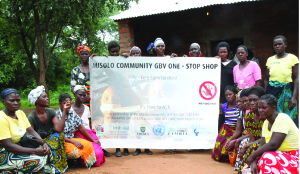
• THE establishment of the Misolo Community Gender Based Violence One Stop Shop has helped to
address the problem of early marriages in some parts of Eastern Province.
AGNES Lungu, 56, is full of remorse and still regrets the day she and her husband married off their 15 year-old daughter to a man they had chosen for her, so that they could get a bride price to help them solve the family’s problems.
“I did not know about the harmful consequences of child marriage, and I feel very guilty I did this. It’s a wrong practice and nobody should do it,” she says.
Child marriages are scandalously common in Kakwiya, Agnes’ village in Zambia’s Eastern Province, where the practice is as high as 60 per cent, accounting for the highest prevalence rate in the country. Child marriage is illegal in Zambia, but the laws are often ignored by communities where marrying children and adolescent girls is common practice.
United Nations data shows that Zambia has one of the highest child marriage rates in the world with 42 per cent of women aged 20-24 years married before the age of 18 – a rate that has not evolved since 2002. The country remains among the top hotspots for the practice that robs girls of both education and childhood. Girls living in rural areas are at a higher risk of being married off at an early age, and those with no access to education are the most vulnerable.
To help address the issue, a United Nations Development Programme (UNDP)-led initiative is working with communities through three village-led One-Stop-Shops on Gender Based Violence (GBV) to raise the awareness of girls, parents, teachers, community leaders, the Police and policymakers about the health and rights implications of young girls getting into marriages.
The scheme is the result of a partnership between the UN Joint Team on Gender Based Violence with UNDP as the lead agency and the Government of Zambia with financial support from the governments of Sweden and Ireland. The US$15 million programme provides women reporting Gender Based Violence with increased access to timely and appropriate health services; an efficient justice delivery system; protection and support services.
Agnes is the leader of her rural female group, Women for Change and was among community-based paralegals (women and men) trained by the Misolo Community Gender Based Violence One-Stop Shop with support from UNDP. Through guidance and knowledge acquired from workshops, she dissolved her daughter’s marriage and brought her back to school.
Provided with bicycles, mobile phones and paralegal training, Agnes and her colleagues have set up neighbourhood watch committees, paralegal and counselling services, and a referral system for GBV cases. They are now the driving force behind a campaign to prevent child marriage, which has been a long-standing tradition in their community.
Fanny Lungu, a paralegal from Misolo Village, says that she already sees a significant reduction in child marriages since the establishment of the Misolo Community Gender Based Violence One Stop Shop. “We talk to families about different ways their girls can contribute to their livelihoods, so that marriage is not seen as the only option,” she says.
Fanny said a girl was almost married off by her parents at just 14 years old. With the girl’s courage to report and protest against the attempted marriage, and the support of the One-Stop Shop, the young girl avoided that fate.
“Child marriage is one of the most pressing development challenges in Zambia. It robs girls of their childhood, denies them their rights to health and education, thereby limiting their opportunities, and leaves them vulnerable to physical, sexual and psychological abuse. We must all act to end a practice that threatens the lives and future of thousands of girls in the country,” says Janet Rogan, the UN Resident Coordinator and UNDP Resident Representative in Zambia.
Traditional leaders inside Zambia are now making it a point to ensure that child marriage, along with other issues surrounding the subject, are being brought out into public discussions during village gatherings. Chief Nyamphande of the Nsenga people in the Eastern Province, which includes Misolo Village, says they are utilising public gatherings as a platform to educate people in his chiefdom about the consequences for families who marry girls off at a young age.
So far, the initiative has prevented 20 child marriages and stopped dowry practices in a number of communities.
For women like Agnes and Fanny, the programme has had an immediate impact. “I am glad my daughter is back in school. I want her to complete school and have a better life,” says a beaming Agnes. -UNDP






